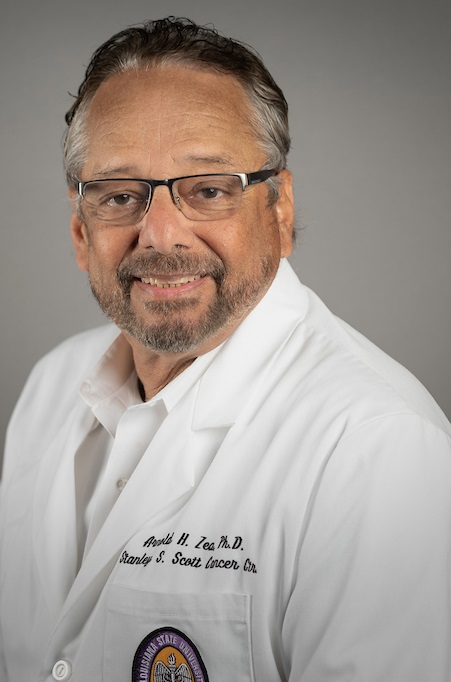
Arnold H. Zea, PhD
Professor - Research
Microbiology, Immunology, and Parasitology
Stanley S. Scott Cancer Center
Professor - Research
Microbiology, Immunology, and Parasitology
Stanley S. Scott Cancer Center
533 Bolivar Street
Clinical Sciences Research Building, Room: 531
New Orleans, LA 70112
azea@lsuhsc.edu
Degrees
MS Microbiology - 1986
Universidad del Valle, Cali, Colombia
PhD Immunology - 2001
Universidad de Antioquia, Medellin, Colombia
Bio
Dr. Zea obtained his MS degree in Microbiology in 1986 from Universidad del Valle in Cali, Colombia, (Dr. Nancy Saravia, PhD (mentor) and his PhD degree in Immunology in 2001 from Universidad de Antioquia in Medellin, Colombia (Dr. Luis Garcia and Dr. Augusto Ochoa, mentors).
During his graduate training Dr. Zea worked at the National Cancer Institute in Maryland under the supervision of Dr. Ochoa at the laboratory of immunotherapy. This laboratory was in charge of the majority of the clinical trials conducted at the NCI. During this time Dr. Zea gained high expertise in flow cytometry, molecular biology, tissue culture, cell biology, cell signaling and laboratory management; all associated with his research focus. Dr. Zea continued with his post-doctoral training in the laboratory of Dr. Ochoa at LSUHSC.
Dr. Zea joined the faculty of LSUHSC-NO as an Instructor of the Department of MIP and as a member of the Stanley S. Scott Cancer Center and the Louisiana Cancer Research Consortium. He was promoted to Assistant Professor in MIP in 2003 with a joint appointment in the Department of Pediatrics and to Associated Professor in 2014. Dr. Zea’s laboratory has been supported over the years by Local, National and Federal agencies.
Besides Dr. Zea research activities, he is currently the Co-director (co-founder) of the LCRC- Biospecimen Repository, the director of the Comprehensive Research Alcohol Center Analytical Core Laboratory and the chairman of the Institutional Biosafety Committee (IBC)
Research Interests
The Zea lab is focused in the immune biology of cancer and tuberculosis. In cancer, Dr. Zea is studying the mechanisms by which L-arginine and L-glutamine metabolism regulates tumor growth-inhibition and immune responses (see Figure below). This work will help to better understand mechanisms of resistance and tumor evasion and to develop new therapeutic strategies to control and possibly eradicate tumors. The knowledge and experience gained in cancer-related research has allowed Dr. Zea to explore whether similar mechanisms can occur in infections by Mycobacterium tuberculosis (Mtb). He is studying in vitro and in vivo mechanisms by which Mtb-cyclic-AMP (cAMP) regulates arginase induction, nitric oxide and cytokine production used by Mtb to survive and persist inside macrophages.
The main goal of these projects is to identify pathways involved in L-arginine metabolism that can betargeted to inhibit tumor and/or Mtb growth/persistence. These findings could facilitate the development of new, unconventional therapies that could eliminate tumors and tuberculosis based on their dependence on L-arginine or L-glutamine. It also has the potential to advance treatments for multi-drug and extensively-drug resistance tuberculosis, where current first line drug therapies are ineffective.
Teaching Activities
Medical Microbiology and Immunology
Methods in Immunology
Basics in Immunology
Fundamentals of Immunology
Special Topics in Cancer Biology
Transplant Immunology
Bacteriology
Laboratory Rotations
Clinical Forum and Medical Ethics
Science and Practice of Medicine

 myLSUHSC
myLSUHSC